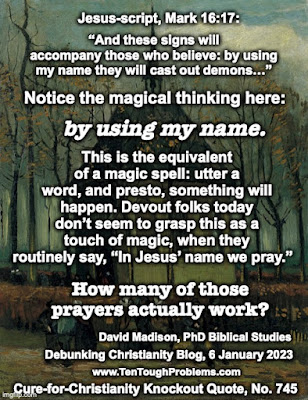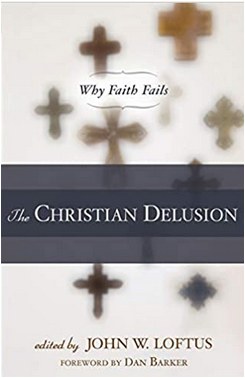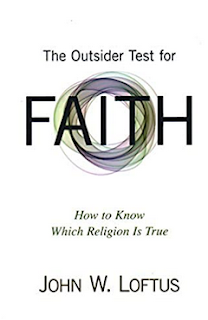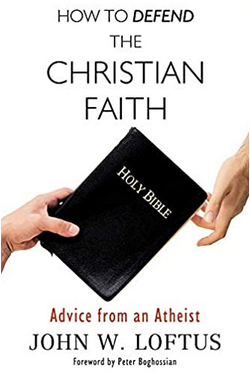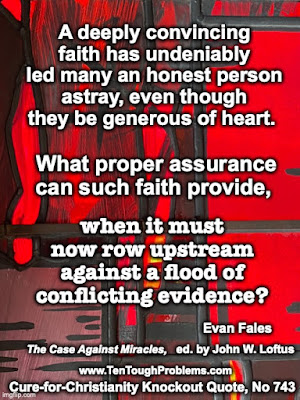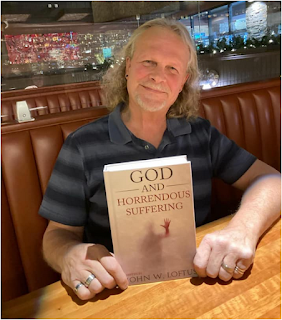Who Was Jesus? Lunatic, Liar, Failed Prophet, Cynic, Sage, Celestrial Being...
I have resisted taking a stand on Jesus Mythicism, arguing instead that, “At best Jesus was a failed apocalyptic prophet.” Halfway position. Not so sanguine now. I have since changed my mind. For a few years I embraced agnosticism. I have now established myself enough to take a stand on this issue. At what point can we say all traces of any real Jesus are gone, and that they’re gone because he never existed as a real person in the first place? We have to work with what we have, not what we hope will be discovered. What we can conclude is that whatever traces of a human being we might find behind the ancient tales of Jesus, at best they are indistinguishable from him not existing at all. Any real Jesus is therefore an unnecessary figure we can do without. That’s good enough when it comes to god and science. It’s good enough here. See: SOURCE.Many atheists are changing their minds on the historical nature of Jesus, but MacDonald singled me out even though I have never argued for the mythicist viewpoint. I guess he wanted my attention. Okay, hi John! I hope 2023 is a good year for you! That being said, since I've never argued on behalf of my current viewpoint, I'm not going to argue with MacDonald either. Nonetheless, I want to refer everyone to the influence of the authors in my co-edited book with Robert M. Price, Varieties of Jesus Mythicism.
In addition to those authors there's the influence of Richard Carrier. In the first place he convincingly shows the book of Acts is fiction. In the New Testament that book is supposed to connect readers of Paul and the gospels to the 1st century historical church, and it fails, miserably. His talk in 2015 was significant for me. Carrier also wrote a significant recent essay, How We Can Know 1 Clement Was Actually Written in the 60s AD, which leads readers to question what we know about early church history itself, apart from the book of Acts. That essay puts all traditional timelines up for questioning and debate. So readers can understand my current view, especially if you read Bart Willruth's 2 Part essay, Reassessing Paul's Timeline. If Willruth's essay was available before we published our Jesus Mythicism anthology, I would've included it. Willruth says:
Robert Price, in his book "The Amazing Colossal Apostle" suggests that Paul's letters date from the late first century CE to the second century CE. While we differ on where to assign a re-dating of Paul, we both recognize that there is no reason to hold to traditional dating. In his post, "How do we know the Apostle Paul Wrote His Epistles in the 50's AD", Richard Carrier acknowledges that "I don’t consider this matter as settled as mainstream scholars do. Paul’s Epistles do fit remarkably well in the 50s B.C."Willruth argues "we have enough reason to point to Paul's probable timeline of letters in the 40's -30's BCE." Then says, "If this chronology is correct, Paul would never have heard of Jesus of Nazareth and couldn’t have been writing to Christians as we would recognize them." He concludes:
The Colossal Embarrassment of Mark 16
A Bible chapter that damages Christian credibility
The case can be made that most Christians don’t take all that seriously the god described in their Bible. This god knows amazing things about every human:
“…even the hairs of your head are all counted.” (Jesus-script, Matthew 10:30)
It is aware of everything that every person says:
“I tell you, on the day of judgment you will have to give an account for every careless word you utter.” (Jesus-script, Matthew 12:36)
And it knows everything we think:
“…on the day when, according to my gospel, God through Christ Jesus judges the secret thoughts of all.” (the apostle Paul, Romans 2:16)
This attentive, intrusive god is also massively impressive on a cosmic scale: “Oh Lord, my God when I, in awesome wonder, consider all the worlds thy hands have made, I see the stars, I hear the rolling thunder, thy power throughout the universe displayed…” (from the hymn, How Great Thou Art)
Upcoming Debate: "Does God Exist?"
Good News for the New Year!
is now available in Spanish translation:
The Kindle version will be priced at $.99 through January 3rd: LINK
The paperbound version costs $10.95. LINK
Please help spread the word about this Spanish translation!
I want to thank especially:
David Cáceres González in Chile for doing the translation. A few months before beginning work on the project, he interviewed me about the book—and added Spanish subtitles.
Tim Sledge, my publisher/editor at Insighting Growth Publications. Tim does a superb job critiquing and reviewing the manuscripts he’s preparing for publication. Tim’s own books include:
Goodbye Jesus: An Evangelical Preacher’s Journey Beyond Faith
Four Disturbing Questions with One Simple Answer: Breaking the Spell of Christian
How to Live a Meaningful Life: Focusing on Things That Matter.
Cheers and Happy New Year, David Madison
David Madison was a pastor in the Methodist Church for nine years, and has a PhD in Biblical Studies from Boston University. He is the author of two books, Ten Tough Problems in Christian Thought and Belief: a Minister-Turned-Atheist Shows Why You Should Ditch the Faith (2016; 2018 Foreword by John Loftus) and Ten Things Christians Wish Jesus Hadn’t Taught: And Other Reasons to Question His Words (2021). His YouTube channel is here. He has written for the Debunking Christianity Blog since 2016.
The Cure-for-Christianity Library©, now with more than 500 titles, is here. A brief video explanation of the Library is here.
Please support us at DC by commenting on and by sharing our posts, or subscribing, donating, or buying our books at Amazon.
All Is Calm, All Is Bright: Not According to Jesus
The coming of his kingdom will be horrific
“Silent night, holy night! All is calm, all is bright. Round yon Virgin, Mother and Child. Holy infant so tender and mild, Sleep in heavenly peace, Sleep in heavenly peace.” The sentiment-saturated Christmas season is gradually receding, with its images of baby Jesus in the manger and Handel’s magnificent music: “For unto us a child is born, unto us a son is given: and the government shall be upon his shoulder: and his name shall be called Wonderful, Counsellor, The mighty God, The everlasting Father, The Prince of Peace.”
This text is from Isaiah 9:6, which the New Testament itself never applies to Jesus. This an example of inventing a Jesus that measures up to your ideal. During the runup to Christmas, I saw memes on social media that reflect this concept: “Instead of putting Christ back into Christmas, try putting Christ back into Christians.” Along with this we hear that Jesus was about love, compassion, helping the poor, caring for refugees: Jesus the good guy, Jesus the best guy.
On Self-Promotion
 | |
|
For about 15 years I owned a carpet cleaning business. My father installed and cleaned carpet so it was natural I did the same when I was no longer a minister. I bought a small established company for $35k, called Brock's Carpet Cleaning Inc. I got the money from a divorce settlement. I had to compete with other established businesses. The way to do that is to promote your business. So I did, with flyers, radio commercials with celebrities praising our company--like a former Mayor--and in coupon books. Notice the section "Don't Just Take our Word For It!" If you have a product to promote then you must promote it, and testimonials help.
I followed the same model when it came to books, since I was an unknown, having no recognition from the four horseman, or WLCraig. My book publishers spent next to nothing on promotion. Prometheus Books just sent out complimentary copies to people, as did others. Darren at GCRR held conferences on my books which helped!
I shared what others were saying about my books just as I shared what people had said about my carpet cleaning. BTW: I prided myself on being The Spot Geek, saying that "If I can't get a spot out then no one can." I educated customers by saying there is a difference between a spot and a stain. A stain is a chemical reaction that changes the color of the fibers. No one can get that out, although there are a few kits and techniques to colorize them back to the original color.
Anyway, people told me not to promote my books, that doing so is unprofessional. I promote them, yes, but you'll never (or almost never) find me saying my books are the shit, which they are! ;-) I let others do the talking for me. When they say so, I in turn say so. So say I!
Labels: John's Books
On Book Publishing and Royalties
I self-published my first book with Trafford Books in 2004. It was titled, From Minister to Honest Doubter: Why I Changed My Mind. I had to do most all the work in formatting it. In it I had a photo of my two professors, James Strauss, who taught at Lincoln Christian Seminary, and Bill Craig, who taught at Trinity Evangelical Divinity School (TEDS). Strauss attended my graduation from TEDS in 1985, where I earned my third master's degree, a ThM. Half of my hours were taken under them both at these two schools. They were my advisors and mentors.
Now as unbelievable as this is, I didn't know at the time, when I self-published this book in 2004, how influential Bill Craig had become since I left TEDS in 1985. I thought it was worth mentioning, but nothing more than that. But when Edward Babinski saw it in print he told everyone about it. People think I'm trying to hitch a ride on the coattails of Craig's acclaim, but I assure you I'm not. My work stands on its own. But people want to know. They want to know if Craig had a wayward former student, and if so, what does that student know that Craig doesn't know? So I mention it. It's mention-worthy, that's all.
Labels: John's Books
Here's the Scoop On the Virgin Birth of a Boy God
Labels: Mere Christianities, Virgin birth
Margaret Downey's Tree of Knowledge 2021
Downey has had a prolific career in secular activism. She is the founder of the Freethought Society, and the Thomas Paine Memorial Committee. She is a past board member of the American Humanist Association, and the Thomas Paine National Historical Association. She is a current board member of the Freedom From Religion Foundation. Downey also serves as an advisor for the Robert Green Ingersoll Birthplace Museum and the Openly Secular campaign.Year after year I watched as she decorated her yearly "Tree of Knowledge" with books she thought were important, as I was publishing mine. Then she finally decorated her 2021 tree with all 12 of mine. Finally! How many books of mine can you spot?
Labels: My Thirteen Books
Merry Mythmas To One And All!
Why I Became an Atheist: A Former Preacher Rejects Christianity

I'm done writing and editing books, so I'm highlighting each one of them in thirteen separate posts.
My first published book, Why I Became an Atheist: A Former Preacher Rejects Christianity, is my magnum opus! If you don't have it you're missing out on what I consider to be my most important work. Pictured is the 2nd edition published in 2012. The 1st edition was published in 2008. Very rare is an atheist book that gets a second edition!
I'm described as a "Former Preacher" in the title. I'm not just a preacher though. I'm a philosopher with several advanced degrees and plenty of classroom time as an instructor of philosophy, ethics, critical thinking, western literature, apologetics, hermeneutics, and a few Bible classes. I taught for the Trine University, Kellogg Community College, Lincoln Christian College, and Great Lakes Christian College. So the words "Former Preacher" don't fully describe me, even though I was in the ministry for about 15 years, mostly while I was also teaching. I had wanted my publisher to call me a "Former Apologist" but they thought few people understood what that means.
I started teaching philosophy and ethics classes in 1985, first for the College of Lake County, in Grayslake, Illinois. In my first class I lost about half my students. As I think back, it was probably due, in part, because I was a flaming evangelical. A larger factor was because the students could not understand me. Yep, that's right. Being in a Ph.D. program at Marquette University, after earning three masters degrees, I didn't know how to bring the information down to college students. So I thought my teaching career was over before it began. Luckily the chair of the philosophy department told me this happens more often than not for first time philosophy instructors. *Whew*
Over time I became an expert teacher, bringing highly complex ideas down to first year students. I eventually learned how to communicate to the average educated person in the pew. My goal was, and is now, to keep it as simple as possible without being simplistic. The problem with this goal is that there are some elitist readers who think I'm ignorant, for if I was smarter and better educated it would reflect in my vocabulary. Smart, highly educated people, it's assumed, use the nomenclature requisite with their educational achievements.
You can see this same "dumbing down", as the elitists call it, reflected in my writings. While I could use technical philosophical language, and quote from the original Hebrew and Greek languages in the Bible, I found that so long as I was accurate I didn’t need to impress people by writing for the scholars.
This is reflected in a few blurbs for my books.
Labels: My Thirteen Books
The Bible Fails as “God’s Truth”—and That’s a Big Relief
The few good bits are swamped by the many bad bits
When the movie, The Ten Commandments, was released in 1956 I was a 14-year-old devout Christian living in a small town in northern Indiana. I saw the film in our town’s only cinema, and was especially awestruck by the slender fiery finger of God descending from the sky to blast onto the stone tablets those famous ten commandments. Yes, that must have been exactly how it happened. I suspect that movie played a role in securing a firm place for this famous law code in American consciousness.
The Christian Delusion: Why Faith Fails
I envisioned my first anthology The Christian Delusion to be an extension of my first book, Why I Became an Atheist. I thought it would be great to get experts to write on topics I addressed in my book. All the themes in it expand on issues raised in my very first book. I personally think The Christian Delusion delivers a powerful blow to conservative Christianity, especially when combined with its predecessor.
Dawkins: I named the book The Christian Delusion after Dawkins' popular bestseller The God Delusion. His focus was on God. Mine was focused on the Christian God. I had hoped it might get his attention. It didn't. In fact, none of the so-called New Atheists--publicly acknowledged my books.
Labels: My Thirteen Books
The End of Christianity
This anthology was named after Sam Harris's book The End of Faith like some others of mine. The so-called New Atheists took aim at God. My books took aim at Christianity in specific, because I knew the most about that religious faith.
After my first anthology, The Christian Delusion, I started telling authors the due date for their submissions was one month earlier than the actual deadline, to avoid last minute submissions. If I was concerned how the chapter was going I would ask for an outline, or rough draft along the way.
Labels: My Thirteen Books
The Outsider Test for Faith: How To Know Which Religion is True
I had wanted the subtitle to be "How to Know Which Religion Is True If There Is One, since I don't think there is one. But that was rejected by my publisher for some ignorant reason I forget now.
Most of my books were conceived and tested on this blog in debates with believers. This is the case with this book more than any other. Here's the Amazon link to my book. In it I'm arguing for a fair test to help believers examine their own faith honestly, without any special pleading or double standards. I am arguing that every honest seeker should embrace it. This should be seen in the first few pages of my book. While I think the test leads to unbelief, that's a separate debate.
God or Godless: One Atheist. One Christian. Twenty Controversial Questions.
I'm done writing and editing books, so I'm highlighting each one of them in thirteen separate posts.
Today I'll tell you about my co-written book with Dr. Randal Rauser, God or Godless?: One Atheist. One Christian. Twenty Controversial Questions, published in April, 2013.
The first thing to say is that Rauser contacted me to co-write the book without first reading my magnum opus Why I Became an Atheist. That's instructive, since he didn't research into how formidable of an opponent I might be.
Labels: My Thirteen Books
Christianity is Not Great: How Faith Fails
I'm done writing and editing books, so I'm highlighting each one of them in thirteen separate posts.
The first thing you should know is that the publisher wanted to name this book, Deliver Us From Evil. Since my goal was to produce books named after the Four Horsemen (plus Victor Stenger, who just missed that party with his 2007 NY Times Bestseller, God: The Failed Hypothesis), I was adamantly opposed to it. So was Richard Carrier, and I think Russell Blackford, who all voiced our objections.
Labels: My Thirteen Books
How To Defend the Christian Faith: Advice from an Atheist
You should know that this book, How to Defend the Christian Faith: Advice from an Atheist, is one I thought about doing before any of my books were published. You can read what I said back in 2006, the year I began blogging. Almost ten years later I did a series of fifteen posts titled, "Do You Want to Be A Christian Apologist? Part 1...15". From them I wrote Part 2 of this book. That same year I did a series of posts on every chapter in God and Evil: The Case for God in a World Filled with Pain,edited by Chad Meister. They became the basis of Part 3 of this book. [Sorry, all deleted now].
Labels: My Thirteen Books
Unapologetic: Why Philosophy of Religion Must End
I'm done writing and editing books, so I'm highlighting each one of them in thirteen separate posts.
Today let's consider my 2016 book, Unapologetic: Why Philosophy of Religion Must End. Just like my books The Outsider Test for Faith, and How To Defend the Christian Faith, this one was also forged in the heat of debate here at DC. I don't expect Christian philosophers to agree with it until after they abandon their faith. Secular philosophers have disagreed with it. But noteworthy ones agree. Actually, I think most all scientifically minded atheist philosophers should agree.
Labels: My Thirteen Books
Harry Potter Changed Water Into Wine—No, Wait—
Miracles or magic: What’s the difference?
One crucial, fundamental rule for responsible Bible study—pursued by adults who can set aside “what the church says”—is this: be curious, be very curious. Another fundamental rule follows as well: be skeptical, be very skeptical. This requires looking below the surface, which should include exploring the writings of biblical scholars: every chapter and verse of the Bible has been studied closely, and the results published.
Christianity in the Light of Science: Critically Examining the World's Largest Religion
I'm done writing and editing books, so I'm highlighting each one of them in thirteen separate posts.
Firstly, Christianity in the Light of Science was dedicated to Victor Stenger, the fifth horseman, who had written:
Throughout history, arguments for and against the existence of God have been largely confined to philosophy and theology. In the meantime, science has sat on the sidelines and quietly watched this game of words march up and down the field. . . . In my 2003 book, Has Science Found God? I critically examined the claims of scientific evidence for God and found them inadequate. In this present book, I will go much farther and argue that by this moment in time science has advanced sufficiently to be able to make a definitive statement on the existence or nonexistence of a God having the attributes that are traditionally associated with the Judeo-Christian-Islamic God. --From the Preface to God: The Failed Hypothesis.After disagreeing with my chosen title for my earlier book, Christianity is not Great, Prometheus Books accepted my book proposal on the condition they would have the final say in naming it. They basically didn't want it named after Stenger's NY Times Bestselling book, such as Christianity: The Failed Hypothesis. After eliminating a few titles it came down to two:
Labels: My Thirteen Books
The Case Against Miracles
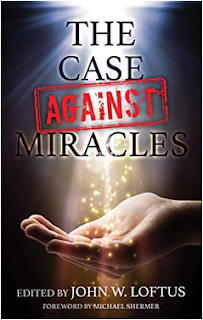
I'm done writing and editing books, so I'm highlighting each one of them in thirteen separate posts. This time we look at The Case against Miracles. [See Tag Below]
After a two year break from producing another anthology (2017-18), due mostly to dating and marrying my wife Sheila. I finally decided to do one again. My decision came from debates on Facebook with Richard Carrier and Matthew Ferguson over the use of Bayes' Theorem in assessing miracles, plus the prodding of Richard Miller (who now posts here at DC). Dr. Miller and I were going to co-edit the book together but it just didn't work out. I thank him for prodding me to do it, and I think the book might have been better if it had worked out.
Labels: My Thirteen Books
Varieties of Jesus Mythicism: Did He Even Exist?
Here is the Amazon link to get this "sure to be a classic" book, right here!
You should read the text of my talk at the Global Center for Religious Research eConference on Jesus Mythicism, which includes my Preface at the end of it.
Labels: My Thirteen Books
God and Horrendous Suffering
 Book Cover: You can see me holding the hardback book above, but there were two other covers to choose from, both of which are possibilities for the 2nd edition.
Book Cover: You can see me holding the hardback book above, but there were two other covers to choose from, both of which are possibilities for the 2nd edition.Authors & Chapters: It was a pleasant surprise that Darren accepted my book proposal before I had many authors and specific chapters. He did so based on the quality of my earlier books That was nice! He offered the possibility for a call for papers, but I didn't need it.
Darren Slade:
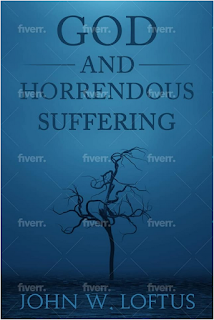 Dr. Slade is my friend and publisher. He was an absolute joy to work with and an expert at what he does.
Dr. Slade is my friend and publisher. He was an absolute joy to work with and an expert at what he does.Vitaly Malkin: Malkin gave me permission to choose an excerpt from his excellent book, Dangerous Illusions for his chapter, The Problem of the Jewish Holocaust. So I did, making a few edits along the way. But when it came to finding the references for his quotes from his bibliography he didn't help at all. I did my best on them, even if it meant quoting from Wikipedia (sorry).
Mark Gura: My friend Mark tried to cram way too much information into one chapter. He went through four different versions until he had it up to 12k words, and asked for more! I know that problem very well. What you'll find in the end result is his content filtered through my edits, as I selected from, re-arranged, and even re-wrote parts of his chapter for clarity, with his consent. It ended up at 7,775 words. I didn't add enough to be a co-author, but the time it took was the same as if I was. Together we made it into a wonderful piece! He has a book in him and I hope he writes it!
Gunther Laird: At the very last minute readers of this blog prodded me to have a chapter on the Thomistic solution to evil, with a critical eye on Catholic apologist Edward Feser's defense of it. Darren's knee-jerk reaction wasn't favorable in allowing it, but he turned right around and did so graciously. Gunther Laird obliged with his chapter. I'm happy about this, although it was surely the reason why the book came out about a month late.
Elicka Peterson Sparks: Sparks didn't have the time to choose an excerpt out of her book, The Devil You Know: The Surprising Link between Conservative Christianity and Crime, for publication. So I summarized her book in an excerpt of 8,000 of her own words. See if you can do that with a book of her size! There are no footnotes in her chapter because one third of her book is in the footnotes! If I included the footnotes it would greatly enlarge her excerpt. You'll have to buy her book to get them, and I recommend you do. Later she copyedited and approved my excerpt. As an aside, I found her an excellent opening quote from Thomas Paine: “Belief in a cruel God makes a cruel man.”
Yes, folks, this is what it takes to be a good editor. I put this book together, dealt with the authors, the publisher, wrote the Introduction plus five chapters, and am promoting it. Doing an anthology of freshly written chapters is one of the most time consuming projects someone can do. This is the seventh time I did it! I've done enough for one person.
--------------
John W. Loftus is a philosopher and counter-apologist credited with 13 critically acclaimed books.
Please support my work by sharing my posts, or by subscribing, donating, or buying my books at Amazon then telling others about them! As an Amazon Associate John earns a small amount of money from purchases made from Amazon. Buying anything through them helps fund my work here, and is greatly appreciated! Thanks for your support!
Labels: My Thirteen Books
My Book, Debating Christianity
My last book "Debating Christianity" was skillfully put together by my friend Jonathan Pearce. [See Tag Below]
Labels: My Thirteen Books
Required Homework for Christians
Trying to get them to read, study, ponder the Bible
One of the old hymns I recall from my Methodist upbringing is Leaning on the Everlasting Arms, which includes these words: “What a blessedness, what a peace is mine, leaning on the everlasting arms. Leaning, leaning, safe and secure from all alarms…” Safe and secure. This security inside the Christian shelter can happen when doubts are denied, when troublesome thoughts are dismissed: “Our priests and preachers must have it right. We believed them when we were toddlers, so why be suspicious now? We’ll keep the faith.” Take it on faith.
The Dangers of Christian Theology
“The violent ideology of Christian nationalism”
If you’re as old as I am—born in 1942—you may remember Dinah Shore singing the famous car commercial on television in the 1950s. The song includes these lyrics:
“See the USA in your Chevrolet, America is asking you to call, drive your Chevrolet through the USA, America’s the greatest land of all…”
We had no doubt that America was the greatest land, a sentiment that fueled our patriotism at the time. But we didn’t really think about it. As kids we also played “cowboys and Indians”—however, it never dawned on us that it was through massive genocide of native Americans that European descendants took possession of what is now the USA. Nor did we give much thought to the role that slavery played in the unfolding of American history. Slavery impacted how the US constitution was written; it provoked a bloody civil war, and left an ugly legacy of racism, which still poisons our society.

